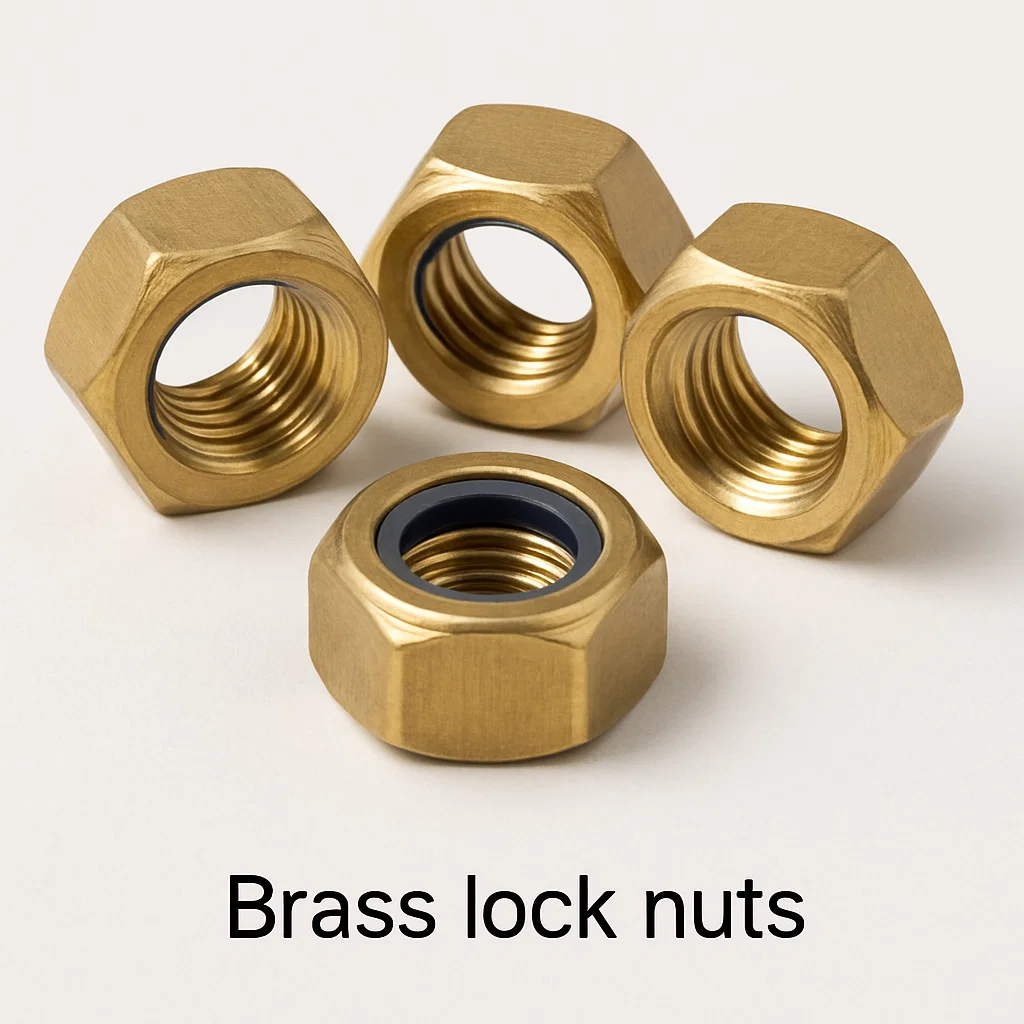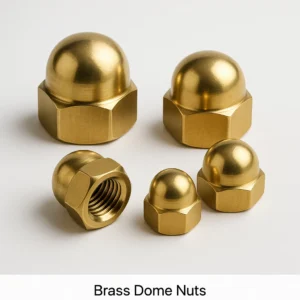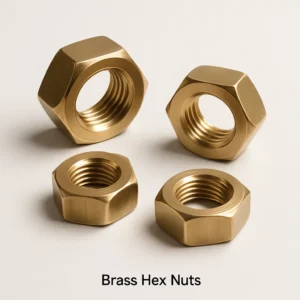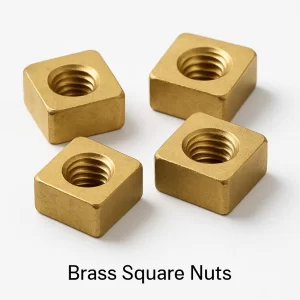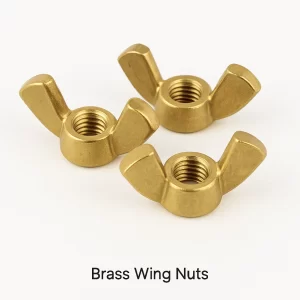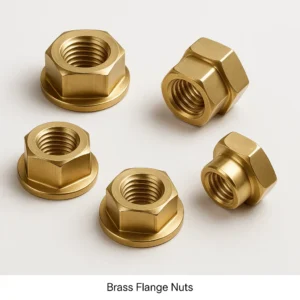Comprehensive Technical Overview of Brass Lock Nuts
We are one of the leading manufacturers and exporters of Brass Lock Nuts, Brass Self-Locking Nuts, and Vibration-Resistant Brass Fasteners from India. We have been supplying high-quality Brass Nylon Insert Lock Nuts, Brass Center Lock Nuts, Brass All-Metal Lock Nuts, Brass Prevailing Torque Nuts, Electrical Brass Lock Nuts, Custom Lock Nuts, and Special Application Brass Lock Nuts to the world market for many decades. Our state-of-the-art manufacturing facility specializes in producing premium Brass Lock Nut Systems using advanced copper alloy formulation, precision hot forging, cold forming technology, CNC machining, nylon insert molding, heat treatment processes, surface finishing, automated assembly, vibration testing, and comprehensive quality assurance systems. With over three decades of global experience in Brass Lock Nut manufacturing, we serve diverse industries including electrical equipment manufacturing, automotive components, marine hardware, industrial machinery, aerospace applications, railway equipment, and vibration-prone environments. Our expertise encompasses working with various brass alloys including Free Cutting Brass (C36000), Architectural Brass (C38500), Naval Brass (C46400), Leaded Brass (C35300), and DZR Brass (CW602N). We manufacture Brass Lock Nuts in sizes from M3 to M24, thread pitches including metric, UNC, UNF, and BSP, maintaining excellent vibration resistance, good electrical conductivity, compliance with ISO 7042, DIN 985, ANSI B18.16.3, ASTM B16 standards, and reliable performance in various demanding applications.
Types of Brass Lock Nuts
Brass Nylon Insert Lock Nuts
Self-Locking Nylon Insert Nuts with non-metallic locking element, featuring blue or natural nylon collar and reusable locking capability. Available in sizes from M3 to M16 with various thread pitches. These Reusable Lock Nuts provide reliable vibration resistance for electrical equipment, automotive assemblies, electronic enclosures, and applications requiring repeated disassembly where consistent locking performance is essential.
Brass All-Metal Lock Nuts
Full Metal Lock Nuts with deformed threads or special locking features, featuring all-brass construction and permanent locking action. Sizes from M4 to M24 with one-time use design. These Permanent Lock Nuts are essential for critical assemblies, safety applications, structural connections, and high-temperature environments where nylon cannot be used.
Brass Center Lock Nuts
Top Locking Nuts with locking feature at the crown, featuring elliptical offset or deformed top threads. Available in sizes from M5 to M20 with reusable capability. These Reusable Metal Lock Nuts are designed for adjustable assemblies, precision equipment, maintenance applications, and situations requiring multiple adjustments while maintaining locking security.
Brass Two-Way Lock Nuts
Reversible Lock Nuts with locking features on both ends, featuring flexible installation and versatile application. These Double-Ended Lock Nuts provide secure fastening for double-ended studs, through-bolting applications, symmetric assemblies, and applications requiring locking from either end.
Brass Flange Lock Nuts
Integrated Washer Lock Nuts with built-in flange and locking mechanism, featuring combined functions and space-saving design. These Multi-Function Lock Nuts are crucial for vibration-prone applications, automotive assemblies, sheet metal fastening, and applications requiring both locking and washer functions.
Material Specifications & Properties
Brass Alloy Composition & Mechanical Properties
| Alloy Type | Composition | Tensile Strength (MPa) | Yield Strength (MPa) | Elongation (%) | Rockwell Hardness |
|---|---|---|---|---|---|
| Free Cutting Brass C36000 | 61.5% Cu, 35.5% Zn, 3% Pb | 340-420 | 170-200 | 25-35 | B78-B85 |
| Architectural Brass C38500 | 57-60% Cu, 35.5-40.5% Zn, 2.5-3.5% Pb | 380-450 | 160-190 | 30-40 | B70-B80 |
| Naval Brass C46400 | 60% Cu, 39.25% Zn, 0.75% Sn | 380-480 | 170-210 | 25-35 | B75-B85 |
| DZR Brass CW602N | 58-60% Cu, 36-38% Zn, 1.6-2.5% Pb | 400-500 | 180-220 | 20-30 | B80-B90 |
Nylon Insert Specifications
| Parameter | Standard Nylon | High-Temp Nylon | Glass-Filled Nylon | Test Standard |
|---|---|---|---|---|
| Temperature Range | -40°C to 120°C | -40°C to 150°C | -40°C to 170°C | ISO 9146 |
| Reuse Capability | 5-10 times | 3-8 times | 8-15 times | DIN 65151 |
| Locking Torque | 30-70% of install | 40-80% of install | 50-90% of install | ISO 2320 |
| Chemical Resistance | Good | Excellent | Superior | ASTM D543 |
Manufacturing Excellence
Advanced Manufacturing Process
Hot Forging Technology: Precision hot forging for superior grain structure and mechanical properties
Cold Forming Process: Multi-stage cold forming for dimensional accuracy
CNC Machining: Precision threading and locking feature machining
Nylon Molding: Injection molding of locking elements with quality control
Heat Treatment: Stress relief annealing for optimal mechanical properties
Surface Treatment: Electroplating, passivation, and special coatings
Quality Testing: 100% dimensional, visual, and functional testing
Quality Assurance Protocols
Raw Material Testing: Spectrochemical analysis for alloy composition verification
Dimensional Control: Optical comparator inspection with statistical process control
Mechanical Testing: Torque testing, tensile testing, and hardness testing
Thread Verification: Go/No-Go gauge testing for thread accuracy
Locking Performance: Vibration testing and torque-tension testing
Performance Validation: Salt spray testing, thermal cycling, and accelerated aging
Technical Specifications & Performance Data
Lock Nut Specifications & Torque Values
| Nut Size | Thread Pitch | Locking Type | Prevailing Torque | Removal Torque | Reuse Capability | Weight (g) |
|---|---|---|---|---|---|---|
| M4 | 0.7mm | Nylon Insert | 0.5-1.0 Nm | 0.3-0.8 Nm | 8-10 times | 0.9 |
| M5 | 0.8mm | Nylon Insert | 0.8-1.5 Nm | 0.6-1.2 Nm | 8-10 times | 1.6 |
| M6 | 1.0mm | Nylon Insert | 1.5-2.5 Nm | 1.2-2.0 Nm | 8-10 times | 3.0 |
| M8 | 1.25mm | Nylon Insert | 3.0-5.0 Nm | 2.5-4.0 Nm | 8-10 times | 7.0 |
| M10 | 1.5mm | Nylon Insert | 6.0-9.0 Nm | 5.0-7.0 Nm | 8-10 times | 14.0 |
| M12 | 1.75mm | Nylon Insert | 10-15 Nm | 8-12 Nm | 5-8 times | 24.0 |
| M16 | 2.0mm | All-Metal | 20-30 Nm | 18-25 Nm | 1-3 times | 55.0 |
Vibration Performance & Locking Efficiency
| Lock Nut Type | Vibration Test Cycles | Locking Efficiency | Temperature Range | Applications |
|---|---|---|---|---|
| Nylon Insert | 10^6 cycles | 85-95% | -40°C to 120°C | General Purpose |
| All-Metal | 5×10^6 cycles | 90-98% | -40°C to 250°C | High-Temperature |
| Center Lock | 3×10^6 cycles | 80-90% | -40°C to 200°C | Adjustable Assemblies |
| Two-Way | 2×10^6 cycles | 75-85% | -40°C to 150°C | Reversible Applications |
Surface Finishes & Coatings
Available Finishes & Specifications
| Finish Type | Thickness | Salt Spray Resistance | Locking Performance | Applications |
|---|---|---|---|---|
| Natural Brass | N/A | 96 hours | Unaffected | Indoor, Electrical |
| Nickel Plated | 5-15μm | 200-300 hours | Slightly Enhanced | Industrial, Marine |
| Chrome Plated | 10-20μm | 300-500 hours | Maintained | Automotive, Marine |
| Tin Plated | 3-10μm | 150-200 hours | Unaffected | Electrical, Food Grade |
| Passivated | 0.5-2μm | 150 hours | Unaffected | Corrosion Protection |
International Standards & Certifications
Global Compliance & Approvals
ISO 7042: Prevailing torque type hexagon nuts
DIN 985: Nylon insert lock nuts
ANSI B18.16.3: American standard for lock nuts
ASTM B16: Standard specification for free-cutting brass rod, bar, and shapes
NASM 25027: Aerospace lock nut specifications
RoHS Compliance: Restriction of hazardous substances
Testing & Certification Standards
Vibration Testing: Junker vibration test per DIN 65151
Torque Testing: Prevailing torque testing per ISO 2320
Temperature Testing: Thermal cycling per ISO 9146
Corrosion Testing: Salt spray testing per ASTM B117
Material Certification: Mill certificates with full traceability
Industry Applications
Electrical & Electronics
Control Panels: Vibration-resistant fastening in electrical enclosures
Busbar Systems: Secure electrical connections under vibration
Transformer Connections: Reliable fastening in power equipment
Electronic Assemblies: Secure mounting of sensitive components
Automotive & Transportation
Engine Components: Vibration-resistant fastening in powertrain
Chassis Assemblies: Secure connections in suspension systems
Electrical Systems: Reliable fastening in vehicle electronics
Brake Systems: Critical safety fastening applications
Industrial Machinery
Rotating Equipment: Secure fastening in pumps and motors
Vibration Machinery: Reliable fastening in vibratory equipment
Process Equipment: Secure connections in chemical plants
Material Handling: Vibration-resistant fastening in conveyors
Installation Guidelines & Maintenance
Professional Installation Procedure
-
Thread Preparation: Clean mating threads and verify compatibility
-
Nut Selection: Choose appropriate locking type for application requirements
-
Hand Tightening: Start threads carefully to prevent cross-threading
-
Torque Application: Use calibrated torque wrench with specified values
-
Locking Verification: Check for proper locking action and engagement
-
Final Inspection: Verify proper seating and locking performance
Maintenance Best Practices
Regular Inspection: Visual inspection for wear, damage, or loosening
Torque Verification: Periodic torque check in critical applications
Vibration Monitoring: Regular assessment in high-vibration environments
Replacement Schedule: Replace after maximum recommended reuses
Performance Testing: Periodic vibration testing in critical applications
Frequently Asked Questions
Q1: How many times can nylon insert lock nuts be reused?
Our standard brass nylon insert lock nuts can typically be reused 8-10 times while maintaining effective locking performance. For critical applications, we recommend replacement after 5-8 uses to ensure reliable vibration resistance.
Q2: What is the temperature limitation for nylon insert lock nuts?
Standard nylon insert lock nuts are rated for continuous service from -40°C to 120°C. For higher temperature applications up to 170°C, we offer glass-filled nylon inserts or recommend all-metal lock nuts.
Q3: Can lock nuts be used with non-standard thread types?
Yes, we manufacture brass lock nuts with various thread types including metric, UNC, UNF, BSP, and special threads. Custom thread specifications are available with minimum order quantities.
Q4: What is the difference between prevailing torque and free-spinning lock nuts?
Prevailing torque lock nuts (like nylon insert) provide resistance throughout installation, while free-spinning lock nuts spin freely until seated then provide locking action. We manufacture both types to suit different application requirements.
Q5: What is the expected service life of your brass lock nuts?
Our brass lock nuts have a service life expectancy of 15-20 years in standard applications and 10-15 years in high-vibration environments when properly installed and maintained, depending on the specific type and application conditions.
Q6: What testing do you perform on finished lock nuts?
We perform 100% dimensional inspection, thread gauge verification, visual examination, locking torque testing, and sample vibration testing. Additionally, we conduct corrosion testing, thermal cycling, reuse capability testing, and material verification.
Contact Us Today – Request Quote for Brass Lock Nuts
Ready to discuss your Brass Lock Nut requirements for vibration-resistant applications, electrical equipment, automotive assemblies, or custom locking solutions?
Request a Quote: Send your specifications including nut size, thread type, locking mechanism, material grade, finish, quantity, and application details to sales@jambrass.com for a detailed quotation within 24 hours.
Technical Support: Email your application requirements or technical drawings for lock nut selection guidance, material recommendation, and performance assistance.
Call Us: +91-22-43449300 / +91-22-43449323 (Monday-Friday, 9:00 AM – 6:00 PM IST)
Office Address: 1406, 14th Floor, Dalamal Tower, Nariman Point, Mumbai – 400021, Maharashtra, INDIA
Factory Address: Plot 10B, GIDC Industrial Estate, Shanker Tekari, Udyognagar, Jamnagar, Gujarat, India – 361004
Contact Person: Mr. Mehul Vora
Email: sales@jambrass.com

